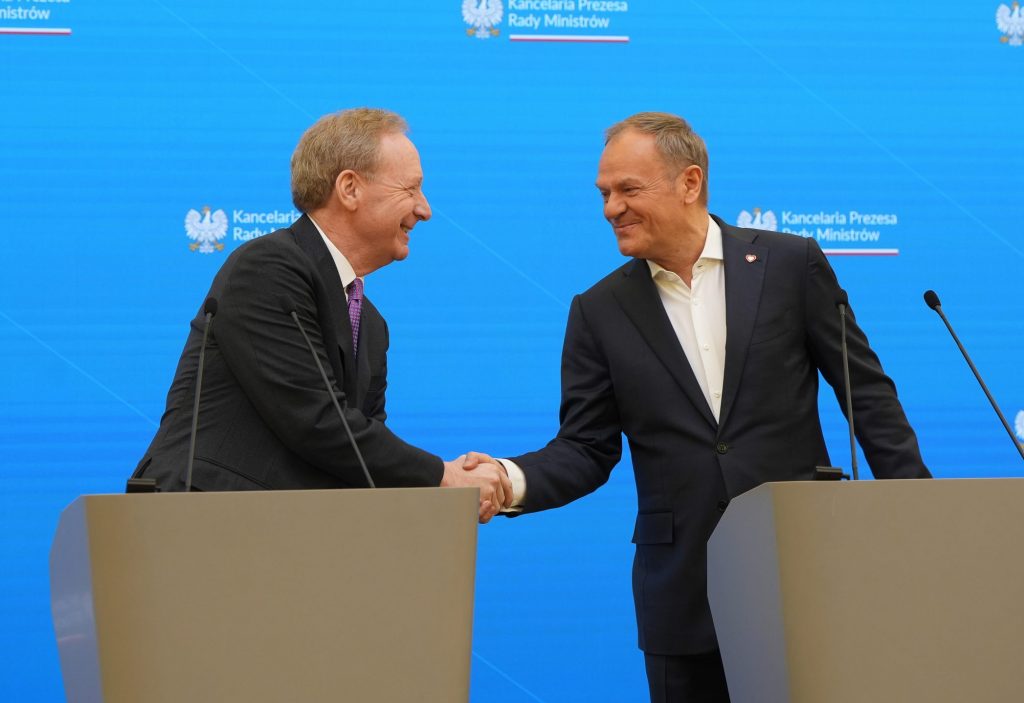Introduction to Microsoft’s Investment in Poland
This morning, I had the privilege of standing alongside Poland’s Prime Minister, Donald Tusk, in Warsaw to announce Microsoft’s latest investment in cloud and AI infrastructure in Europe. Building on our initial $1 billion investment to launch a Polish cloud region in 2023, we are committing an additional $700 million by mid-next year to expand our computing capacity in the country. Furthermore, we will be deepening our collaboration with the Polish National Defense to enhance Poland’s cybersecurity, focusing on the development of AI competencies and emerging digital technologies, including new AI and quantum breakthroughs.
Significance of the Investment
This investment marks a critical step forward for Microsoft’s business, economic, and political relationships in Poland, as well as in Europe as a whole. Over the past 16 months, we have announced over $20 billion in AI and cloud infrastructure investments, which are integral to our datacenter expansion across 15 European countries. Today’s investment in Poland is part of an integrated supply chain we are building with manufacturers across the EU, involving suppliers from Poland, Italy, France, Germany, Finland, Ireland, the United Kingdom, and even components manufactured and exported from Indiana in the United States. This type of investment not only creates jobs but also fosters economic growth throughout Europe and across the Atlantic.
Promoting Trans-Atlantic Investment, Trade, and Economic Growth
The American technology sector is at the forefront of developing world-leading AI technology and is committed to being a trusted "partner of choice" globally. Meanwhile, European policy leaders are focused on mobilizing more capital and increasing productivity by "closing the innovation gap." Despite the current geopolitical landscape, our announcement today illustrates that these two technology ambitions are more aligned than divergent. Our investment in Poland demonstrates how the technology sector has transformed since I first joined Microsoft over 31 years ago. We now support our global technology products and services with significant national investments in infrastructure and large numbers of local employees, showcasing the need for coordinated investments that connect countries and span oceans.
Sustained Technology Support During a Decade of Crises
Technology has become crucial for national needs during times of crisis. European Commission President Ursula von der Leyen has highlighted that Europe faces a competitiveness challenge, marking the third crisis of the 2020s, following the pandemic and the war in Ukraine. It’s essential to recognize the critical role technology has played in supporting responses to these crises. Five years ago, at the onset of the pandemic, Microsoft’s employees and partners used new video and productivity technology like Teams to keep the economy moving forward across Europe. Businesses, schools, universities, hospitals, and governments were able to sustain their operations by moving online in a matter of days.
Addressing the War in Ukraine
Two years later, when the Russian military invaded Ukraine, Microsoft helped move Ukraine’s critical data and technology services to our datacenters across Europe, ensuring their continued operation despite the conflict. We also assisted Ukraine’s officials and citizens in defending against Russian cyberattacks, providing over $250 million in free technology and financial assistance, support that we continue to this day. As Europe now launches a new "competitiveness compass," technology will again play an indispensable role. Economic growth and prosperity will depend more than ever on new technology, particularly as working-age populations shrink and aging populations expand.
A Strong Foundation for Europe’s AI Transition
AI is rapidly becoming a General Purpose Technology (GPT), boosting innovation and productivity across the entire economy. GPTs have historically driven economic growth and sparked new discoveries and inventions, changing how we live and work. The foundation for Europe’s AI transition is already being laid, with industry leaders investing tens of billions in state-of-the-art infrastructure to help Europe access, adopt, and innovate with the world’s most advanced cloud and AI technology. Companies like Microsoft are developing and offering innovative AI tools and vital services ready for use by every sector of every European economy.
Developing AI Infrastructure with European Needs in Mind
As a company, we are developing and operating our AI infrastructure and platform services with a constant focus on Europe’s needs. This is why we announced our AI Access Principles in Barcelona a year ago, eleven principles that govern our operations to ensure Microsoft’s AI infrastructure is accessible, open, and available on fair terms to the entire European economy. We’ve also recognized the vital role of open-source software and AI models for European researchers, start-ups, businesses, and governments, launching the Azure AI Foundry to help developers build, run, and optimize AI-driven applications.
Investing in AI Skills Across Europe
We understand that technology innovation requires investments in people. That’s why we’re investing in our AI Skilling Initiative across Europe, partnering with government, education, industry, and civil society to bring AI skills to users, developers, and organizational leaders. Through our strategic partnerships, we have already helped to skill 2.9 million Europeans and are on track to engage 8 million people by the end of the year.
Technology Collaboration Built on Interdependence
We acknowledge that European leaders sometimes worry about becoming overly dependent on American technology, concerns we take seriously and work hard to address by understanding European values, supporting European needs, and adapting to European rules. However, it’s also important to recognize that this dependence runs both ways. As a company, we are pouring tens of billions of dollars into acquiring land, constructing massive buildings, and installing the world’s most advanced computing and networking technology in Europe.
Conclusion
As Microsoft celebrates its 50th birthday, we look back on more than four decades of European presence and support. Our support for Europe has been steady and steadfast, even as we and the world around us have changed. With deep roots in communities and countries across the continent, we remain committed to our investments and partnerships in Europe, acknowledging the interdependence that underpins our technology collaboration.
Source Link





